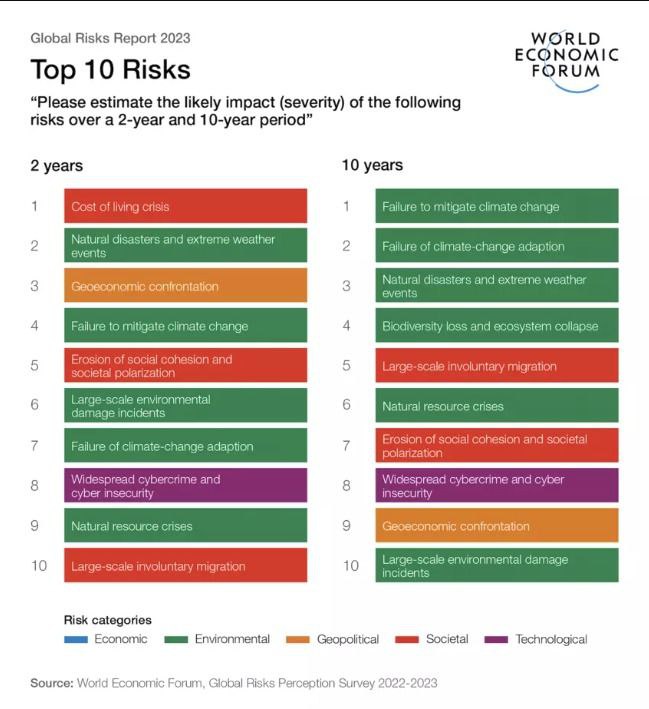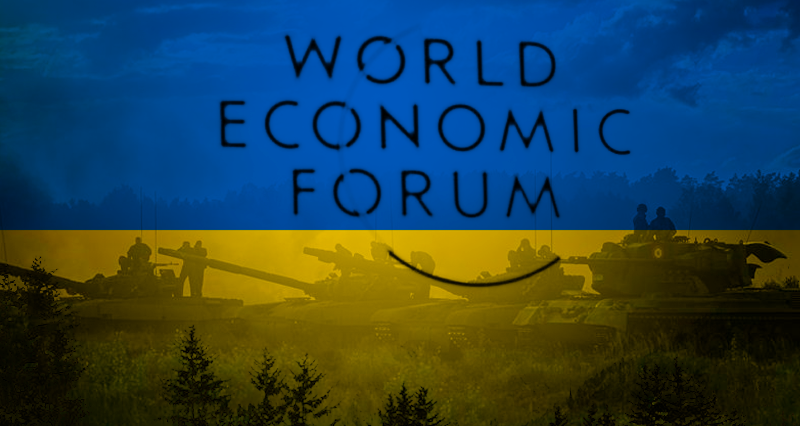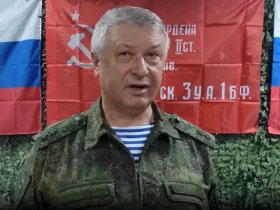The 53rd meeting of the World Economic Forum (WEF), also known as the Davos Summit, was held on January 16-20. With the slogan “Cooperation in a Fragmented World”, more than 2,700 people attended the Forum from 30 countries, including 50 heads of state or government, as well as representatives of international organizations and the business world.
The forum mainly addressed themes such as “the current energy and food crises”, “Covid-19 pandemic”, ”climate change”, “the transformation of the economy by new technologies” and “rising inflation”. Of course, the war in Ukraine was also a heated topic in many sessions and for many speakers.
‘Stuck in a crisis mindset’
Klaus Schwab, founder and executive chair of the WEF, called before the meeting for a strategic way to handle the issues instead of short-term approaches and defined the current thinking as a “crisis mindset”. He said that Davos should help to shift that mindset that “we are all stuck in”: “We have to manage in a strategic way this transformation period, which may last three, four, five years and will be socially very painful.”
WEF’s Global Risks Report 2023 lists the top 10 risks that need to be dealt with. According to the report, the biggest problem worldwide in the next 2 years will be the cost of living. In the 10 years, the ranking changes.

Ukraine ranks number 1
Aside from the longer-term and structural issues that the Report points to, one of the topics that marked the Forum was the war in Ukraine. it would not be wrong to argue that the only issue on which all speakers at the Forum agreed was “the need to defeat Russian aggression” and “support Ukraine”. The fact that Davos 2022 had begun with a live address from Ukrainian President Vladimir Zelenskiy tells much.
Last year, on the official website of the WEF, Ukraine had ranked first in the agenda-setting themes emerging from the Forum: “Theme #1: Ukraine shines a light on importance of global cooperation”. And Ukrainian President Vladimir Zelenskiy was chosen as the main photo of the page.
Message to “authoritarian leaders”
In the plenary session on “Restoring Security and Peace”, the NATO Secretary General Jens Stoltenberg stressed the “unprecedented support” for Ukraine provided by NATO. Stoltenberg stating that “President Putin doesn’t win this war” claimed that would be “a tragedy for Ukrainians” and “very dangerous for all of us” due being “a message to authoritarian leaders, not only to Putin but also other authoritarian leaders is that when they use brutal force when they violate international law, they achieve what they want”.
Ursula von der Leyen, President of the European Commission, began her speech with Ukraine and saluted Olena Zelenska, the wife of Volodymyr Zelenskiy, who was present in the conference room. Von der Leyen reiterated the European Union’s continued support for Ukraine,
Olena Zelenska also made a speech in Davos. She called for “a unified front against Russian aggression” and urged the participants to use their influence in support of Ukraine.
In the pursuit of Leopard 2 tanks
Volodymyr Zelenskiy attended Davos via video link. His emphasis was for Ukraine to be supplied with heavy tanks. He warned that “tyranny is outpacing democracy -which can also be read as a criticism to Western leadership- and demanded “resolve and speed in decision-making”
Everyone is well aware that the target of Zelensky’s words was German Chancellor Olaf Scholz. There is enormous pressure from the US and almost all NATO member states in Europe for Germany to authorize the supply of Leopard 2 tanks to Ukraine. “There had been hopes that Olaf Scholz might announce a decision on allowing Leopard 2 Tanks to be sent to Ukraine during his speech at Davos, but he has not” reported The Guardian regarding the expectations from Scholz in Davos.
Avoiding Russia-NATO war
Olaf Scholz pledged additional military support to Ukraine in his speech, but not Leopard 2 tanks. When asked if Germany would send the tanks to Ukraine, he said that the Ukrainians can rely on Germany’s support, but also hinted at how far it might extend (or cannot extend) with his words “we will avoid that this is becoming a war between Russia and NATO.”
Big oil lying
Maybe in a meeting of the world’s sovereigns, Antonio Guterres, the Secretary-General of the United Nations, made the most down-to-earth righteous speech. He basically talked about climate change, “morally bankrupt financial system” and the “Great Fracture” between China and the US.
For climate change Guterres directly the corporate leaders: “Here at Davos, I call on all corporate leaders to act on it. Put forward credible and transparent transition plans on how to achieve net zero – and submit those plans before the end of this year. The transition to net zero must be grounded in real emissions cuts – and not rely on carbon credits and shadow markets.” Moreover he accused Big Oil of lying. He said, “fossil fuel producers and their enablers are still racing to expand production, knowing full well that their business model is inconsistent with human survival.”
Reforming the global financial system
He mentioned “frustration and anger over a morally bankrupt financial system”, emphasized the inequality it generated between country blocks and offered “reforming and building fairness into the global financial system.” More concretely: “Developing countries need access to finance to reduce poverty and hunger and advance the Sustainable Development Goals.”
As for the China-US confrontation, Guterres referred to his own term “Great Fracture” and elaborated on it. He claimed that is “a tectonic rift that would create two different sets of trade rules, two dominant currencies, two internets and two conflicting strategies on artificial intelligence”.
‘Escort-Boom in Davos’
The German newspaper Bild shed light on a dimension of Davos other than the official meetings. Bild reported with the headline “Escort boom in Davos” that wealthy business people and politicians showed great interest in escorts during the summit. “Even the oldest industry in the world is represented at the Swiss World Economic Summit.”, wrote Bild with sarcasm, “And knows no crisis!”.Bild talked to an escort lady with the pseudonym “Liana” and wrote: “For the evening, Liana has an appointment with a regular customer, an American. ‘Whenever he’s in Switzerland, he calls me’. That happens several times a year. She charges the equivalent of 700 euros for a quickie, and anyone who wants to spend the night with her pays 2300 euros. Plus travel costs.
Who knows what?
Many people question what good such meetings do (other than creating a common culture, network, etc. within the global rulers, of course). It is demanding to apprehend what Davos man gains in every one of such meetings. But at least this time we are not alone. Apparently, Slovenia Deputy Prime Minister and Foreign Minister Tanja Fajon shares this feeling to some extent: ”This week listening to the politicians, I was surprised in a way because I got the feeling that no one really knows exactly where we are heading and what the solutions can be.”

















Leave a Reply